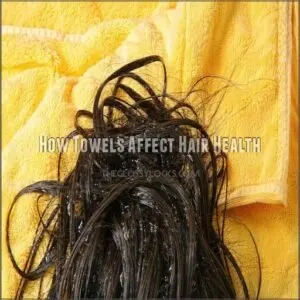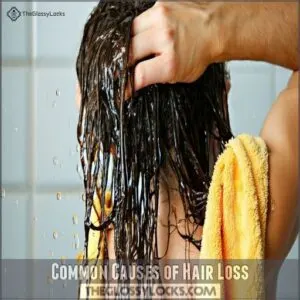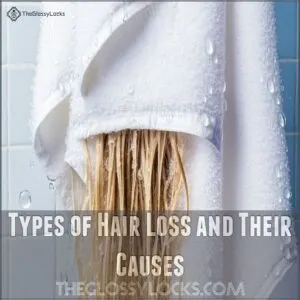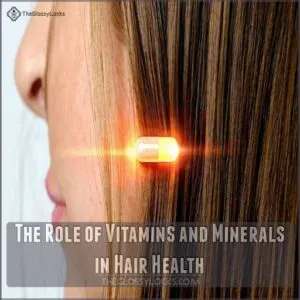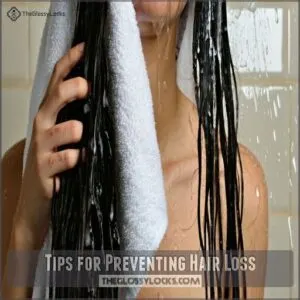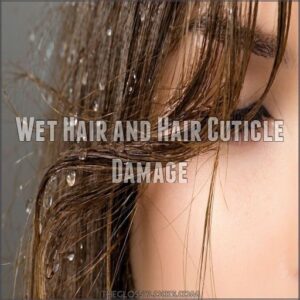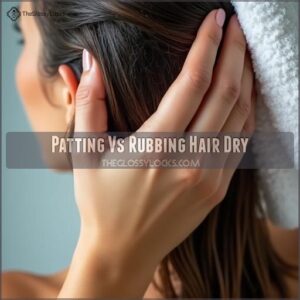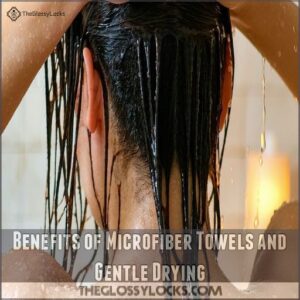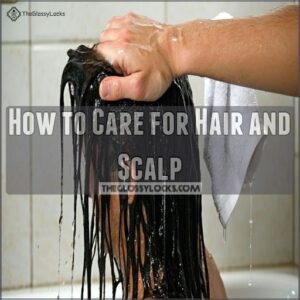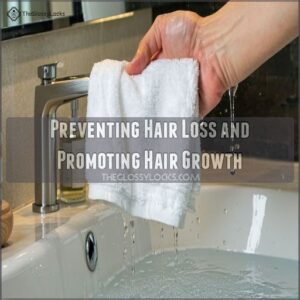This site is supported by our readers. We may earn a commission, at no cost to you, if you purchase through links.
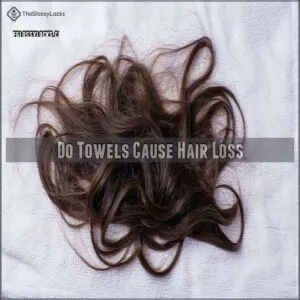
When your hair is wet, it’s like a soap bubble—fragile and easily popped.
Vigorously rubbing it with a towel can cause damage, leading to breakage and, yes, hair loss over time.
The trick is to be gentle.
Instead of going at it like you’re buffing a car, consider the damage caused by regular towels, especially when compared to using a microfiber hair towel vs t shirt, try patting your hair dry or using a microfiber towel.
These are softer on your strands and help tame that frizz too.
So, put away the elbow grease, and you might save your hair’s day.
Curious about the best towel techniques? Read on!
Table Of Contents
- Key Takeaways
- How Towels Affect Hair Health
- Do Towels Cause Hair Loss
- Common Causes of Hair Loss
- Types of Hair Loss and Their Causes
- The Role of Vitamins and Minerals in Hair Health
- Tips for Preventing Hair Loss
- The Impact of Towel Drying on Hair Cuticles
- Gentle Hair Care for Strong and Healthy Hair
- Frequently Asked Questions (FAQs)
- Does using a towel damage your hair?
- What are the causes of hair loss and weight loss?
- Can towel drying damage your hair?
- Does a towel pull on your hair over time?
- Can rubbing a towel on your hair make it fall out?
- Is it bad to rub a towel on wet hair?
- Are towels bad for your hair?
- Is it normal for hair to fall out when towel drying?
- Is it better to let your hair dry without a towel?
- Is it good to put your hair up in a towel?
- Are certain towel fabrics better for hair?
- Can towel rubbing lead to dandruff?
- How often should towels be washed?
- Do microfiber towels reduce hair breakage?
- What is the best way to dry curly hair?
- Conclusion
Key Takeaways
- Towels don’t directly cause hair loss, but vigorous rubbing creates friction, leading to breakage and damage over time.
- Swap your cotton towels for microfiber versions to reduce frizz and minimize breakage. They’re gentler on your hair.
- Using a hair turban towel, such as the Bamboo Hair Towel Wrap, can be a gentler alternative to regular towels, instead of rubbing, gently pat or squeeze your hair dry with a microfiber towel to protect your strands.
- Consider factors like nutrition, stress, and hair care products, as they also play significant roles in hair health.
How Towels Affect Hair Health
You’ve probably never thought twice about how you dry your hair after a shower, but that everyday towel routine might be doing more damage than you realize.
While towels can help absorb excess water from your hair, the way you’re using them could be causing breakage, frizz, and even contributing to hair loss.
Friction and Damage
When you’re drying your hair, friction’s to blame for more than just split ends and frizz—it’s a sneaky culprit behind scalp irritation and hair thinning too.
Here’s how it happens:
- Vigorous rubbing weakens strands.
- Constant friction causes hair breakage.
- Damp strands are more vulnerable.
So, next time, be gentle and consider the consequences!
Microfiber Vs Cotton Towels
Imagine this: You just showered, reached for your towel, and—surprise! It’s cotton. But is that a hair-care faux pas?
Switching to a microfiber hair towel can make a big difference, especially considering the benefits of microfiber towels, which are ultra-absorbent and fast-drying, reducing drying time and heat damage, as highlighted in the polyester vs microfiber hair towel comparison.
| Feature | Microfiber | Cotton |
|---|---|---|
| Absorbency | High | Moderate |
| Hair Texture | Gentle on curls | Friction on straight hair |
| Drying Time | Faster | Slower |
| Cost Comparison | Often pricier | Usually cheaper |
Feel the difference for yourself!
Proper Towel Drying Techniques
Here’s how to towel dry your hair without causing damage.
1. Start with a microfiber towel for its benefits—it’s gentle and reduces friction.
2. Gently squeeze your hair, avoiding vigorous rubbing that can lead to frizz and breakage.
3. Finish by applying a leave-in conditioner to lock in moisture, preventing towel drying mistakes.
Gentle drying methods are key!
Do Towels Cause Hair Loss
You might be wondering if those trusty towels in your bathroom could be behind your thinning hair.
The short answer is no—towels themselves don’t cause hair loss.
However, how you use them can impact your hair health.
Vigorous towel drying techniques can lead to hair breakage due to the friction created, especially if you’re using rough cotton towels.
Products designed to minimize towel hair breakage solutions can make a big difference in preventing damage.
Opting for gentler towel materials, like microfiber, reduces this risk.
Picture your hair as a delicate fabric; treating it with care guarantees minimal damage.
When you dry your hair, swap the brisk rubbing for gentle patting.
It’s a simple tweak to your hair care routine that protects your strands and keeps your mane looking luscious.
Common Causes of Hair Loss
You might blame the towel or the brush, but hair loss often starts with genetics and hormonal changes.
While environmental stress and nutrition play their parts, sometimes it’s just a matter of aging and lifestyle choices that tip the scale.
Genetics and Hormonal Changes
When hair loss runs in the family or hormones misbehave, your locks might thin like leaves in autumn.
Hormone imbalances can lead to:
- Pregnancy hair loss: It’s common, but hair often bounces back.
- Menopause and hair: Hormonal changes may cause shedding.
- Thyroid disorders: Such imbalances can shake up your hair’s health.
Medical Conditions and Aging
Besides genetics and hormones, various medical conditions can trigger hair loss.
Think of your body as a complex machine—when something’s amiss, it can affect your hair.
For example, thyroid problems, often affecting hormone levels, can cause hair thinning.
Autoimmune diseases, like alopecia areata, attack hair follicles.
| Condition | Description | Impact on Hair |
|---|---|---|
| Thyroid Disorders | Imbalances in thyroid hormones. | Hair thinning, breakage, dry scalp. |
| Autoimmune Diseases | The immune system mistakenly attacks healthy tissues, including hair follicles. | Patchy hair loss, alopecia areata. |
| Certain Medications | Some medications list hair loss as a side effect. | Thinning or shedding. |
Aging also plays a role; as you age, hair follicles shrink, producing finer, shorter hairs.
Don’t panic, though—many hair loss treatments are available.
Environmental and Physical Stressors
Pollution and sun damage can sneakily mess with your scalp health. It’s like your hair’s worst enemies, silently causing trouble over time.
Using a regular towel to dry your hair can also lead to towel damage hair care.
Throw in heat styling and rising stress levels, and you’ve got a recipe for hair chaos.
Stress can make hair jump ship, literally! So, keep those locks protected and cherish your crowning glory by lowering stress.
Poor Nutrition and Lifestyle Choices
Think of your hair as a garden.
Without the right diet, such as consuming protein-rich foods for growth, stress levels, sleep, exercise, and hydration, things can get a little… sparse.
Poor nutrition limits the nutrients your hair needs to grow strong and healthy.
Disruptions to your hair’s natural hair growth cycle stages can occur due to hormonal imbalances, such as thyroid dysfunction. Lack of sleep or stress can mess with your hair’s growth cycles.
Keep it simple: eat well, stay active, and hydrate.
Types of Hair Loss and Their Causes
You might notice your hair thinning or find clumps in your brush and wonder, "What’s happening?"
From genetics to stress, uncovering the reasons behind different types of hair loss can help you tackle the issue head-on before reaching for a towel again.
Androgenetic Alopecia
You might wonder if towel habits cause hair loss, but it’s more about genetics and age.
Androgenetic alopecia, known as male or female pattern baldness, results from genetic predisposition and hormonal impact.
For individuals experiencing hair loss, considering medications for hair loss can be a viable option.
Picture your DNA as a blueprint setting the stage for hair loss.
Treatment options range from medications to hair restoration strategies.
You’re not alone; many tackle this challenge!
Telogen Effluvium
Ever found your hair thinning suddenly? It might be telogen effluvium, where stress like diet changes, medication, pregnancy, or thyroid issues push hair into a resting phase.
Consider exploring non-surgical hair loss treatment options for women here to address hormonal imbalances and other underlying causes.
Here’s what you can do:
- Manage Stress: Practice relaxation techniques.
- Eat Right: Make sure you have a balanced diet rich in vitamins.
- Check Medications: Consult your doctor about possible side effects.
Anagen Effluvium
Imagine this: your hair takes a nosedive due to anagen effluvium, often caused by treatments like chemotherapy.
It’s like your hair’s taking an unwelcome vacation.
Stress and certain medications can lead to hair loss, too.
But don’t fret, as hair growth usually bounces back once the underlying issue is addressed.
Tackle it with care, and your hair will thank you.
Tinea Capitis
Unlike anagen effluvium’s sudden hair shedding, tinea capitis sneaks up on you—a sneaky fungal infection.
It’s a ringworm of the scalp, causing patchy hair loss, scaling, and itching.
Tinea capitis symptoms can vary, but spotting them early is key.
Treatment options usually involve antifungal medications.
Good scalp hygiene helps prevent this fungal foe.
Remember, prevention is better than cure!
Alopecia Areata
Alopecia areata is like that surprise party you didn’t want.
It’s an autoimmune disorder where your immune system mistakenly attacks hair follicles, leading to patchy hair loss.
Triggers can include:
- Stress or traumatic events
- Genetic predispositions
- Infection or illness
- Severe allergies
Treatment options focus on reducing stress and autoimmune responses, often leading to hair regrowth over time.
The Role of Vitamins and Minerals in Hair Health
You’re probably not losing hair because of your towel, but if you’re skipping essential vitamins and minerals, you might be.
Just like your car needs gas to run, your hair needs nutrients like vitamins A and E to stay strong and healthy.
Essential Nutrients for Hair Growth
You know, your hair’s best friends are nutrients like protein, zinc, and iron.
They’re key players in hair growth.
Biotin, often found in supplements, boosts hair strength.
Think of protein as your hair’s building block, while iron fuels those follicles.
Zinc keeps hair happy and healthy.
Eat well, and consider supplements, but don’t overdo it.
The Link Between Vitamin Deficiencies and Hair Loss
Stressed about your hair health? Vitamin deficiencies might be the sneaky culprits behind hair loss.
When your body’s running low on these nutrients:
- Biotin: A lack can lead to weaker hair.
- Iron: Its absence may cause shedding.
- Zinc: Deficiency can disrupt your hair growth cycle.
- Vitamin D: Essential for hair follicle health.
- Vitamin A: Needed for growth and maintenance.
Addressing Shortfalls Through Diet and Supplements
Feeling like you’re chasing your tail with hair health?
Make peace with your pantry!
Essential hair growth nutrients might just be hiding in your diet.
Tackling vitamin deficiencies with the right hair loss supplements or dietary remedies can be a game changer, as Ayurvedic approaches to hair growth emphasize the importance of addressing underlying imbalances, such as those related to the three doshas – Vata, Pitta, and Kapha, which can be found in Ayurvedic Hair Growth.
Jump on the holistic hair health bandwagon and nourish those strands with a blend of food and fun, no magic potions required.
Tips for Preventing Hair Loss
You mightn’t realize it, but small changes in your hair care routine can make a big difference in preventing hair loss.
Start by choosing the right shampoo, handling your hair gently, and saying goodbye to stress—your locks will thank you!
Choosing The Right Shampoo
Choosing the right shampoo is key to preventing hair loss.
Let’s talk ingredients!
Your hair type dictates shampoo frequency: oily hair needs more frequent washes than dry hair.
Look for sulfate-free shampoo to protect your scalp health.
Maintaining a scalp free of conditions such as alopecia and scalp issues can help promote overall scalp health. Remember, a healthy scalp means healthy hair!
Consider your hair’s needs—fine, thick, curly—when selecting your shampoo.
Don’t overthink it; simple is often best.
Avoiding Chemical Ingredients
Think twice before using shampoos with harsh chemicals! Opt for natural hair care and organic shampoos—they’re like a gentle hug for your hair.
DIY hair masks can also work wonders.
Be savvy with ingredient awareness; these little tweaks steer you away from damage. Avoid chemical-packed styling products, and welcome chemical-free styling. Your scalp will thank you!
Gentle Hair Care and Styling
You’ve weeded out those pesky chemicals, now focus on gentle hair care and styling.
Avoid breakage with these easy steps:
- Detangle: Use a wide-tooth comb on damp hair.
- Products: Opt for lightweight styling products that respect your scalp’s health.
- Hair masks: Treat yourself weekly for added moisture and shine.
Your hair will thank you!
Reducing Stress and Protecting Hair From Damage
Stress isn’t just a party pooper; it can really mess with your hair.
A calmer lifestyle helps maintain a strong mane.
Balance is key: manage stress, protect your scalp with the right hair products, and embrace lifestyle changes to enhance scalp health.
Rethink what triggers stress and make adjustments to support your hair care routine.
| Tip | Benefit |
|---|---|
| Manage Stress | Healthier hair |
| Use Gentle Products | Scalp protection |
| Regular Exercise | Stress relief |
| Balanced Diet | Hair support |
The Impact of Towel Drying on Hair Cuticles
You mightn’t think twice about how you dry your hair, but that towel could be roughing up your hair cuticles more than you think.
Instead of rubbing vigorously like you’re buffing a car, try patting gently to keep those cuticles happy and healthy.
Wet Hair and Hair Cuticle Damage
Avoid singing like a rock star just yet.
Wet hair is a bit like your favorite sweater—tug it too hard and you’ll snag the yarn.
When heat styling on wet hair, the open hair cuticle becomes an inviting target for damage.
Instead, embrace gentle towel drying. It’s like giving your hair a soft hug, reducing breakage and keeping those cuticles happy.
Patting Vs Rubbing Hair Dry
Wet hair is vulnerable, like a superhero without a cape. Patting rather than rubbing is your secret weapon for frizz control and hair cuticle health.
Here’s the lowdown:
- Pat and Press: Use a soft towel to gently press moisture out.
- Rubbing Risks: Vigorous rubbing can rough up hair texture.
- Damage Prevention: Treat your hair with care to keep it strong.
Benefits of Microfiber Towels and Gentle Drying
So, you’ve mastered patting your hair dry.
Now, let’s talk microfiber towels.
These aren’t your grandma’s scratchy bath towels.
By using gentle drying techniques like air dry hair methods, you can really see the difference.
Microfiber towel benefits include less friction, meaning less frizz and breakage.
Gentle drying techniques using microfiber keep your hair cuticle happy and healthy.
Think of it as a spa day for your strands.
Say goodbye to hair damage prevention struggles and hello to smoother, shinier hair!
Gentle Hair Care for Strong and Healthy Hair
Your hair’s health depends a lot on how you treat it, starting right from the towel you use.
By switching to gentle routines and tools, like using a microfiber towel instead of playing tug-of-war with your strands, you can keep your hair happy and strong without risking needless breakage.
How to Care for Hair and Scalp
Scalp health starts with gentle care.
Use hair products suited to your type; think of them as your hair’s best friends.
When brushing, be kind—no wild tussles.
Eating a balanced hair diet can make your hair as strong as you’d like your willpower to be.
Remember, happy hair loves care and just a touch of humor.
Preventing Hair Loss and Promoting Hair Growth
Ever wondered if you’re losing hair faster than your patience with rush-hour traffic? Here’s how to keep those locks in place:
- Shampoo Smart: Choose sulfate-free options to protect delicate strands.
- Diet Matters: Incorporate lean proteins, iron, and vitamins.
- Stress Less: Practice relaxation techniques, and see the difference.
- Supplement Wisely: Boost growth with biotin or omega-3s.
Frequently Asked Questions (FAQs)
Does using a towel damage your hair?
Using a towel can damage your hair if you’re not careful.
Vigorous rubbing creates friction, leading to frizz and potential breakage.
Instead, gently pat or squeeze your hair with a soft microfiber towel for minimal damage.
What are the causes of hair loss and weight loss?
Think of your body like a finely tuned machine.
Hair loss and weight loss can stem from various issues, including genetics, hormonal changes, stress, or underlying health problems.
Don’t panic; see a doctor to figure out what’s up.
Can towel drying damage your hair?
Towel drying your hair can cause damage if done too harshly.
Vigorous rubbing creates friction, leading to frizz and breakage.
Gently squeezing with a microfiber towel helps protect your hair, keeping it healthier and looking great.
Does a towel pull on your hair over time?
Yes, regular towel drying can tug on your hair, leading to potential damage over time.
Rubbing too hard or using coarse towels adds friction, causing breakage and frizz.
Switching to a gentle microfiber towel helps minimize this issue.
Can rubbing a towel on your hair make it fall out?
Rubbing a towel on your hair mightn’t make it fall out instantly, but do it like you’re drying a wet dog, and you’re asking for trouble.
Vigorous rubbing can cause breakage, frizz, and potential damage over time.
Is it bad to rub a towel on wet hair?
When you rub a towel on wet hair, it can cause friction, leading to frizz, damage, and even breakage, especially if you have fine or porous hair.
So gently blot instead.
Are towels bad for your hair?
Towels aren’t inherently bad for your hair, but be mindful of how you use them.
Vigorous rubbing, like giving your hair a noogie, can cause breakage and frizz.
Try gently squeezing with a soft microfiber towel instead.
Is it normal for hair to fall out when towel drying?
It’s totally normal to lose a few hairs while towel-drying—it’s just a natural part of the hair cycle. Don’t panic! But, be gentle; rough drying can increase breakage.
Is it better to let your hair dry without a towel?
Skipping towels can feel like nature giving your hair a chance to breathe.
Air drying is gentle, avoiding friction damage and reducing frizz.
It’s a natural, no-fuss method, although it might take longer.
Is it good to put your hair up in a towel?
Wrapping your hair in a towel can reduce frizz and define curls if done gently.
Avoid twisting tightly to prevent breakage.
Use a soft, microfiber towel for best results, as rough cotton can damage delicate strands.
Are certain towel fabrics better for hair?
For gentle hair care, microfiber towels are a cut above the rest.
They reduce frizz and breakage compared to cotton towels.
So, swap out that old towel for smoother, happier hair.
Can towel rubbing lead to dandruff?
Rubbing your hair with a towel mightn’t directly cause dandruff, but it can irritate your scalp, creating a dry environment.
This friction might make existing dandruff more noticeable.
Use a gentle touch to prevent issues.
How often should towels be washed?
Wash your towels every three to four uses to keep them fresh and free of bacteria.
This prevents mildew and unpleasant odors.
Ensuring they’re always ready to gently dry your hair without causing damage or irritation.
Do microfiber towels reduce hair breakage?
Microfiber towels gently absorb moisture without creating friction, unlike traditional towels.
Rubbing your hair with regular towels can lead to excessive friction and cause hair damage and breakage. Microfiber towels are great for hair, reducing hair breakage and frizz.
Their soft texture makes them a great choice for keeping your hair healthy and tangle-free.
Who knew towels could be so kind?
What is the best way to dry curly hair?
Got curly hair? Air drying’s gentle, but slow. A diffuser on low heat helps define those gorgeous curls without the frizz! Want faster results? Try plopping!
Conclusion
Imagine the surprise of a long-haired friend who swapped her cotton towel for microfiber, noticing her strands felt softer and healthier.
Towels don’t directly cause hair loss, but how you use them matters.
Rough drying can damage the fragile wet hair, leading to breakage over time.
Embrace gentle patting and microfiber towels to protect your locks.
Remember, though, multiple factors play into hair loss, so take a holistic approach to your hair care routine.

